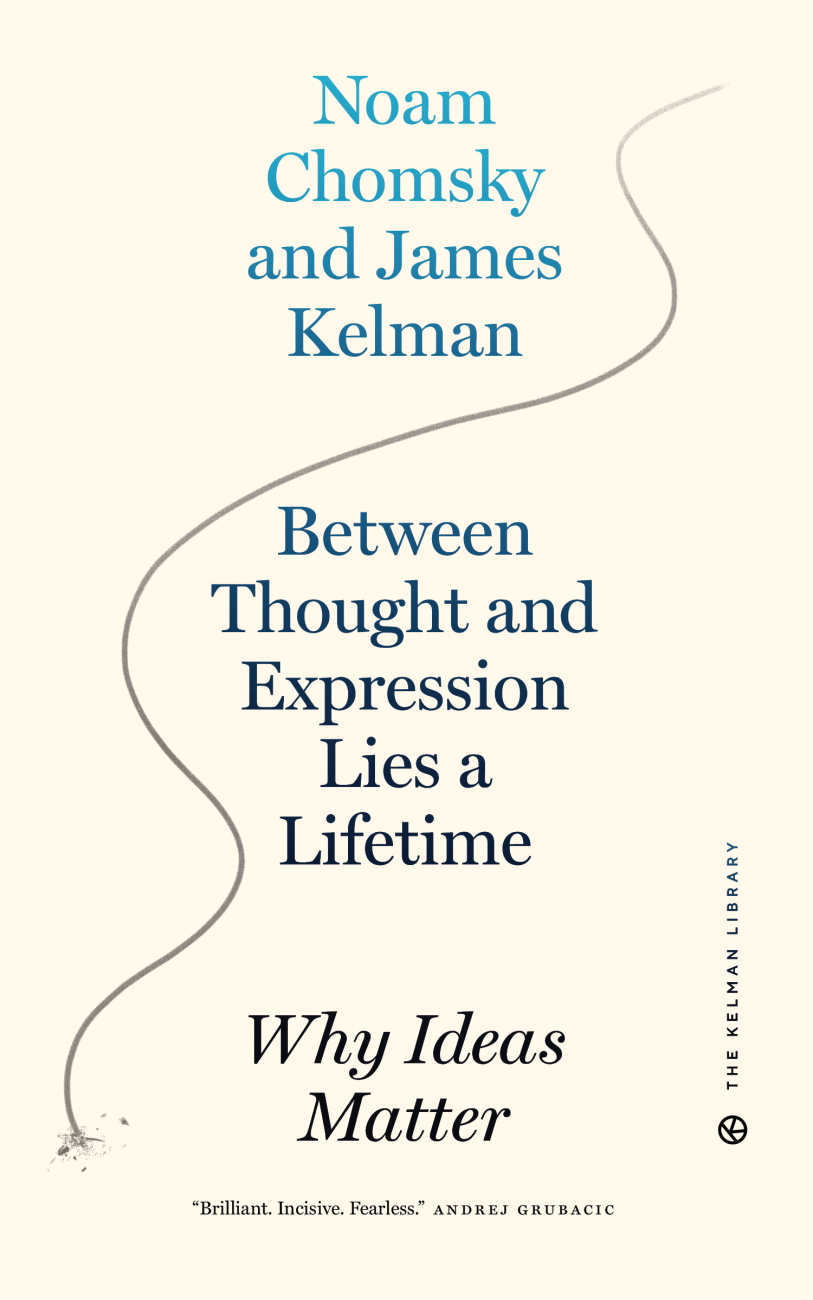Address change to reviews.pivic.com
This site is changing its address.

James Kelman started his correspondence with Noam Chomsky in 1988. This book is not dissimilar in how correspondence between two individuals work in earnest: it’s back-and-forth, torn between different subjects, and not always in agreement.
This book not only serves as a cachet of printed letters but also as a small biography of Chomsky, a sort of binder of speeches that Chomsky held while in the UK, and as a container for some of Kelman’s political and humanist ideas.
At the start of this book, Kelman reaches for what is one of Chomsky’s core political tenets: the idea that anarchy is a human tendency, what Bakunin called ‘an instinct for freedom’:
Rousseau is an important thinker for Chomsky. It was what Rousseau perceived as the strength of the will to self-determination that led him to propose “the struggle for freedom [as] an essential human attribute.”
Kelman ponders on Chomsky’s ideas of the so-called orthodox left:
Arguments from human nature and fixed principles are usually regarded as reactionary by the orthodox left. They take it to lead to hierarchy, people being born to rule or to serve; people being born lazy or talented, being born good at mathematics, or at dancing or painting pictures, or being born selfish, etc. Such arguments are thought to suggest that we are not born free at all but are chained to our essential selves and thus have our lives, and the lives of our children, determined for us in ways that are forever beyond our own control. There may be elements of this that can be framed validly. Chomsky looks on “human nature … as a system of a sort familiar in the biological world, a system of ‘mental organs.’” Against the “left-liberal spectrum” his defense takes the following course: Human talents vary considerably, within a fixed framework that is characteristic of the species and that permits ample scope for creative work, including the creative work of appreciating the achievements of others. This should be a matter for delight rather than a condition to be abhorred. Those who assume otherwise must be adopting the tacit premise that people’s rights or social reward are somehow contingent on their abilities. But for most mainstream intellectuals a true democracy is a form of meritocracy, a system whereby highly educated specialists will be rewarded in accordance with the quantity of knowledge they have consumed in their specialist subject; in this kind of society a twenty-three-year-old university graduate will begin his or her working life at a salary some two to three times that of a woman or man who has spent the past thirty years working on a factory production line. As Chomsky has said, meritocracies “insofar as they exist at all, are simply a social malady to be overcome much as slavery had to be eliminated at an earlier stage of human history.” The basic principle of humankind is freedom, the right to not be tortured, the right to not be raped, the right to not be violated, the right to not be colonized in any way whatsoever. It is an inalienable right; whether it is deduced or whether it has to be discovered in any other manner is not of great significance—such questions can only be of ultimate interest to those whose ideological position is served by obscuring the issue. Either we do battle on behalf of the basic principle or we do not. This seems to me to be Chomsky’s position. It is not a new one but it remains as dangerous as ever. I cannot conceive of someone reading deeply on Chomsky’s work and failing to be moved by it. His writings are banned in some countries and anathema to the ruling minorities of most of the rest.
Kelman does a good job in contextualising some of Chomsky’s main ideas of the time in contrast to a popular Western world-view at the time. Mainly, Kelman focuses on the Reagan and Thatcher administrations’ ability to bring neoliberalism to the World.
I enjoyed reading Chomsky’s letters to Kelman, which will no doubt be illuminated farther in the coming book by Beverly Stohl, who was Chomsky’s personal assistant for 24 years.
April 2, 2002
Dear Jim,
Some things never change, like my e-mail address, mail address, and crazy life, getting crazier all the time. Turkey was fascinating, particularly the Southeast, where I was able to spend a day. Am supposed to write something about it but have been so utterly overwhelmed that I haven’t been able to write about that or a thousand other things I’m supposed to do. Glad to hear about what you’re up to and look forward to seeing it in print—and I promise to understand. Will you be in Texas next fall? I recall that you were going up and back. I’ll be passing through Austin for a day or two on my endless rabble-rousing expeditions.
Noam
The book contains many serious movements and addresses; US hegemony (Vietnam, Iraq, Central America, Sudan), universal grammar, the importance of activism, how propaganda works, colonialism… The list goes on.
In the end, this is an important and fragmented book. It is not as valuable as, for example, books that David Barsamian has made with Chomsky, but it has fervour, verve, and, most importantly, style that should interest most readers.
As more freedom and rights are won, new methods are contrived to cage “the great beast,” as Alexander Hamilton called the people.